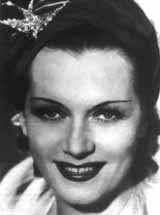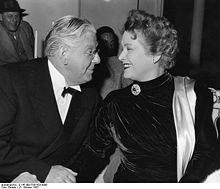
Olga Chekhova
Encyclopedia

Russian Empire
The Russian Empire was a state that existed from 1721 until the Russian Revolution of 1917. It was the successor to the Tsardom of Russia and the predecessor of the Soviet Union...
(now Gyumri, Armenia
Armenia
Armenia , officially the Republic of Armenia , is a landlocked mountainous country in the Caucasus region of Eurasia...
) — 9 March 1980, Berlin, Germany) was a Russian-German actress. Her film roles include the female lead in Alfred Hitchcock
Alfred Hitchcock
Sir Alfred Joseph Hitchcock, KBE was a British film director and producer. He pioneered many techniques in the suspense and psychological thriller genres. After a successful career in British cinema in both silent films and early talkies, Hitchcock moved to Hollywood...
's Mary (1931).
Biography
Born Olga Knipper, she was the daughter of Konstantin Knipper, a railway engineer and the niece and namesake of Olga KnipperOlga Knipper
Olga Leonardovna Knipper-Chekhova was a Russian stage actress. She was married to Anton Chekhov.Knipper was among the 39 original members of the Moscow Art Theatre when it was formed by Constantin Stanislavski in 1898...
(Anton Chekhov
Anton Chekhov
Anton Pavlovich Chekhov was a Russian physician, dramatist and author who is considered to be among the greatest writers of short stories in history. His career as a dramatist produced four classics and his best short stories are held in high esteem by writers and critics...
's wife), both Lutherans
Lutheranism
Lutheranism is a major branch of Western Christianity that identifies with the theology of Martin Luther, a German reformer. Luther's efforts to reform the theology and practice of the church launched the Protestant Reformation...
of ethnic German descent. She went to school in Tsarskoye Selo
Tsarskoye Selo
Tsarskoye Selo is the town containing a former Russian residence of the imperial family and visiting nobility, located south from the center of St. Petersburg. It is now part of the town of Pushkin and of the World Heritage Site Saint Petersburg and Related Groups of Monuments.-History:In...
but, after watching Eleonora Duse
Eleonora Duse
-Life and career:Duse was born in Vigevano, Lombardy, and began acting as a child. Both her father and her grandfather were actors, and she joined the troupe at age four. Due to poverty, she initially worked continually, traveling from city to city with whichever troupe her family was currently...
, joined the Moscow Art Theatre
Moscow Art Theatre
The Moscow Art Theatre is a theatre company in Moscow that the seminal Russian theatre practitioner Constantin Stanislavski, together with the playwright and director Vladimir Nemirovich-Danchenko, founded in 1898. It was conceived as a venue for naturalistic theatre, in contrast to the melodramas...
's studio. There she met the great actor Mikhail Chekhov (Anton's nephew) in 1915 and married him the same year, taking his surname as her own. Their daughter, also named Olga, was born in 1916.
Two years after the 1917 October Revolution
October Revolution
The October Revolution , also known as the Great October Socialist Revolution , Red October, the October Uprising or the Bolshevik Revolution, was a political revolution and a part of the Russian Revolution of 1917...
, Chekhova divorced her husband but kept his name. She managed to get a travel passport from the Soviet government, possibly in exchange for cooperation, which led to permission to leave Russia. She was accompanied by a Soviet agent on a train to Vienna
Vienna
Vienna is the capital and largest city of the Republic of Austria and one of the nine states of Austria. Vienna is Austria's primary city, with a population of about 1.723 million , and is by far the largest city in Austria, as well as its cultural, economic, and political centre...
, then she moved to Berlin
Berlin
Berlin is the capital city of Germany and is one of the 16 states of Germany. With a population of 3.45 million people, Berlin is Germany's largest city. It is the second most populous city proper and the seventh most populous urban area in the European Union...
in 1920. Her first cinema role was in Friedrich Wilhelm Murnau
Friedrich Wilhelm Murnau
Friedrich Wilhelm "F. W." Murnau was one of the most influential German film directors of the silent era, and a prominent figure in the expressionist movement in German cinema during the 1920s...
silent movie Schloß Vogelöd (1921). She played in Max Reinhardt
Max Reinhardt (theatre director)
----Max Reinhardt was an Austrian theater and film director and actor.-Biography:...
's productions at UFA, the same studios where Fritz Lang
Fritz Lang
Friedrich Christian Anton "Fritz" Lang was an Austrian-American filmmaker, screenwriter, and occasional film producer and actor. One of the best known émigrés from Germany's school of Expressionism, he was dubbed the "Master of Darkness" by the British Film Institute...
directed Metropolis
Metropolis (film)
Metropolis is a 1927 German expressionist film in the science-fiction genre directed by Fritz Lang. Produced in Germany during a stable period of the Weimar Republic, Metropolis is set in a futuristic urban dystopia and makes use of this context to explore the social crisis between workers and...
(1927). She made the successful transition from silent film to talkies. In the 1930s, she rose to become one of the brightest stars of the Third Reich and was admired by Adolf Hitler
Adolf Hitler
Adolf Hitler was an Austrian-born German politician and the leader of the National Socialist German Workers Party , commonly referred to as the Nazi Party). He was Chancellor of Germany from 1933 to 1945, and head of state from 1934 to 1945...
. She appeared in such films as Der Choral von Leuthen
Der Choral von Leuthen
Der Choral von Leuthen was a 1933 German film depicting Frederick the Great, directed by Carl Froelich. The screenplay was written by Johannes Brandt and Ilse Spath-Baron. The film starred Otto Gebühr, Olga Tschechowa and Elga Brink....
although she preferred comedies.
Joseph Goebbels
A published photograph of her sitting beside Hitler at a reception gave the leaders of the Soviet intelligence service the impression that she had close contacts with Hitler. She had more contact with the Minister of Propaganda, Joseph GoebbelsJoseph Goebbels
Paul Joseph Goebbels was a German politician and Reich Minister of Propaganda in Nazi Germany from 1933 to 1945. As one of Adolf Hitler's closest associates and most devout followers, he was known for his zealous oratory and anti-Semitism...
, who referred to her in his diaries as "eine charmante Frau" ("a charming lady").
Later years

World War II
World War II, or the Second World War , was a global conflict lasting from 1939 to 1945, involving most of the world's nations—including all of the great powers—eventually forming two opposing military alliances: the Allies and the Axis...
her acting career was less successful; her one film made in Hollywood
Hollywood, Los Angeles, California
Hollywood is a famous district in Los Angeles, California, United States situated west-northwest of downtown Los Angeles. Due to its fame and cultural identity as the historical center of movie studios and movie stars, the word Hollywood is often used as a metonym of American cinema...
was unpopular, largely because her accent was too strong. After the war she lived in the Soviet sector of Berlin, but eventually she managed to escape from her Soviet contacts. In 1949, she moved to Munich, Bavaria, and launched a cosmetics company. At the same time she continued acting, and played supporting roles and cameos in more than 20 films. She largely retired from acting in the 70s, after publishing a book of memoirs. Her correspondence with Russian actors Olga Knipper
Olga Knipper
Olga Leonardovna Knipper-Chekhova was a Russian stage actress. She was married to Anton Chekhov.Knipper was among the 39 original members of the Moscow Art Theatre when it was formed by Constantin Stanislavski in 1898...
and Alla Tarasova
Alla Tarasova
Alla Konstantinovna Tarasova was a leading actress of Constantin Stanislavski's Moscow Art Theatre from the late 1920s onward.A title role in Anna Karenina was her most resounding success. She appeared to mixed reviews as Katerina in the screen version of Ostrovsky's The Storm and as Catherine I...
was published posthumously.
Filmography
- 1921: Schloß Vogelöd
- 1921: Hochstapler
- 1923: Nora
- 1923: Der verlorene Schuh
- 1926: Familie Schikmek
- 1927: Brennende Grenze
- 1927: Der Florentiner Hut
- 1930: Liebling der Götter
- 1930: Die Drei von der Tankstelle
- 1930: Mary (Director: Alfred HitchcockAlfred HitchcockSir Alfred Joseph Hitchcock, KBE was a British film director and producer. He pioneered many techniques in the suspense and psychological thriller genres. After a successful career in British cinema in both silent films and early talkies, Hitchcock moved to Hollywood...
) - 1932: Friedrich von der Trenck, Roman einer großen Liebe
- 1932: Der Choral von LeuthenDer Choral von LeuthenDer Choral von Leuthen was a 1933 German film depicting Frederick the Great, directed by Carl Froelich. The screenplay was written by Johannes Brandt and Ilse Spath-Baron. The film starred Otto Gebühr, Olga Tschechowa and Elga Brink....
- 1932: Liebelei
- 1934: Regine
- 1934: Die Welt ohne Maske
- 1934: Peer Gynt
- 1934: Maskerade
- 1935: Lockspitzel Asew
- 1935: Künstlerliebe
- 1935: Die ewige Maske
- 1935: Ein Walzer um den Stephansturm
- 1935/36: Der Favorite der Kaiserin
- 1936: Seine Tochter ist der Peter
- 1936: Petersburger Romanze
- 1936: Burgtheater
- 1936: Hannerl und ihre Liebhaber
- 1937: Unter Ausschluß der Öffentlichkeit
- 1937: Liebe geht seltsame Wege
- 1937: Gewitterflug zu Claudia
- 1937: Die gelbe Flagge
- 1938: Rote Orchideen
- 1939: Die unheimlichen Wünsche
- 1939: Ich verweigere die Aussage
- 1939: Parkstraße 13
- 1939: Bel AmiBel Ami (1939 film)Bel Ami is a German film version of Guy de Maupassant's novel Bel Ami directed by Willi Forst and released in 1939.- Plot :In Paris, in about 1900, George Duroy, just returned from Morocco, spends a night with the singer Rachel, who is rehearsing the song Bel Ami. Later at a party he tells the...
- 1939: Befreite Hände
- 1940: Angelika
- 1940: Leidenschaft
- 1940: Der Fuchs von Glenarvon
- 1941: Menschen im SturmMenschen im SturmMenschen im Sturm is a 1941 German film. It was anti-Serbian propaganda and part of a concerted propaganda push against Serbs, attempting to split them from the Croats.-Synopsis:...
- 1942: Mit den Augen einer Frau
- 1942: Andreas Schlüter
- 1943: Reise in die Vergangenheit
- 1943: Gefährlicher Frühling
- 1943: Der ewige Klang
- 1945: Im Tempel der Venus
- 1949: Eine Nacht im Séparée
- 1950: Kein Engel ist so rein
- 1950: Der Mann, der zweimal leben wollte
- 1950: Maharadscha wider Willen
- 1950: Eine Frau mit Herz
- 1950: Zwei in einem Anzug
- 1950: Aufruhr im Paradies
- 1951: Das Geheimnis einer Ehe
- 1951: Mein Freund, der Dieb
- 1951: Begierde
- 1952: Hinter Klostermauern
- 1953: Alles für Papa
- 1954: Rosen-Resli
- 1954: Rittmeister Wronski
- 1958: U 47 – Kapitänleutnant Prien
- 1963: Jack und Jenny
- 1973: Die Zwillinge vom Immenhof
- 1974: Frühling auf Immenhof

